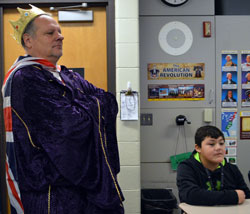
Fifth-grader Jerzey Wright didn’t want to part with her candy, but alas, her hoodie had a zipper. King George III had declared such an accessory be taxed one M&M.
Jerzey slid under her desk dramatically at the news that her once ample allotment of candy pieces would dwindle to two. She reached one arm up from below the desk as tax collector Jo’ Vaughn Grover came for payment. “Give me my M&Ms back!” demanded the Wyoming Intermediate School student.
At the front of the classroom in his office chair-turned-throne, King George, played by Principal Kirk Bloomquist, showed no empathy as he taxed shoelaces, jewelry and buttons to pay off England’s debt from the French and Indian War. As students handed over more and more candy pieces to tax collectors, they began to cry foul.

The king, however, proved relentless. “If you are a girl, please pay one M&M,” he ordered.
The Colonists’ Side of Things
Students were assigned roles of tax collectors, parliamentarians and colonists. After each decree from the king, collectors came for colonists’ candy-coated chocolates and brought them back to the king and parliament.
The social studies lesson on taxation without representation taught students about events leading up to the Revolutionary War while giving a sense of how colonists felt when taxed on goods by a faraway king. It was a tactile lesson about historical themes that audiences will see played out onstage in “Hamilton,” the hit Broadway musical that opens at DeVos Hall tonight, Jan. 21.
“M&Ms are something the students love and will work for,” said teacher Anna Limbeck. “When they are taken from them unfairly, they feel it a lot more… It develops a connection between this activity and taxes in real life.”

As they move on in the unit, students remember the injustice they felt when learning why colonists sought independence when they didn’t have a voice in what was taxed.
“It would have been more fair if they would have had a say and voted about what they were taxed for,” said fifth grader Ashonna Fudge.
Ashonna pointed out how the taxes didn’t benefit the colonists. “When your parents pay taxes they are used to build different buildings and pay for things in the city.”
Tax collector Lucy Renteria said it was exciting collecting the candy-coated chocolate, but she felt bad too. “It was sad because it really wasn’t fair for them. Their faces were mad and sad when I was taking their M&Ms.”














